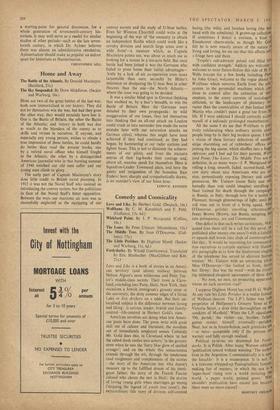Comedy and Cosmicality
Love and Like is a book of stories in an Ameri- can territory (and idiom) midway between Nelson Algrcn's neon wilderness and Peter Tay- lor's middle-class secrets. Their town is Cleve- land, extending into Paris, Haiti, New York, their occasions a Jewish immigrant's grocery store or the university, the dirty summer edges of a Great Lake or Zen Archery on a table. But their un- localised subject is the difference between loving and liking: is serious, tender, Jewish and family- centred—life-centred in Herbert Gold's view.
American novelists are doing what few Ameri- can poets have done. The poets write with great skill out of culture and literature, the novelists out of immediately employed senses. Certainly Mr. Gold does this, in Cleveland where 'at last the salted slush rustles into sewers,' in the grocery store when he sees the 'furry blue glow of spoiled oranges'; and on the whole this sensuousness extends through the wit, through the tenderness (and toughness) and completeness of the stories --the story of the American boy who doesn't measure up to the fulfilled dream of his immi- grant father; the story of the French Fascist colonel who cheats the tart in Haiti; the stories of loving young girls when marriages go wrong (`stepping the legend of youth into noon'), the extraordinary title story of divorce, self-centred
hating (the wife), and loveless loving (the husi band with the substitute). A grown-up collection' If sometimes I detect a cosiness, a kind Eisenhower charm-smile, as though Mr. Gol felt he is now exactly aware of the nature living and loving, let me say that this affects will' a fringe here and there.
`Tropile's sub-adrenals pulsed and filled him with confident strength.' Addicts are welcome.' welcome to most future-fiction this side of H. 0
Wells (except for a few books including Pali by John Gray), welcome to the rogue planet Is
Wolf bane which removes Earth from the solar
system, to the pyramidal machines which cos' finite in control after the extinction of their
creators, to the corny currents of sociological criticism, to the landscapes of planetary vise vaster than the cosmicalities of that fantast Jobs
Martin who couldn't paint a great toe from the life. If I were addicted I should correctly accuse myself of a tediously prolonged masturbation.
All the same I do see that Wolf bane is pose' tively exhilarating when ordinary novels about people limp by in their big modern queue. I have a vision of these literary defectives of another stripe shambling out of rubbishers' offices and joining the big queue, which shuffles into a loge oblivion; and I feel sad for their parents. Wick' ford Point. The Loser, The Middle Tree are 0 defective, in so many ways—J. P. Marquand rolling a long, smooth, faded, second-hand, nar row story about nice Americans who are not nice, pretentiously exposing literary and soda' pretension, Mr. Ustinov (more flatly and old' hattedly than you could imagine) unrolling I Nazi trained for death through the campaigns. in Russia. in Italy, through love for a tartlet IS Florence, through glimmerings of light, until the roll runs out in front of a firing squad. Miss O'Donovan girlishly unrolling schoolteachei Jenny Brown (Brown, not Bunn). tempting het into delinquency, sex and Communism.
One defect is that each writes atrociously, Mat' quand (can there still be a call for this novel. re' published after twenty-one years?) with a liability to squash dull words into clods of commonplace, like this: 'It would be interesting for communica' tion executives to compile statistics with illustra' tivc paragraphs as to how the inadvertent ringing! of the telephone has served to alleviate human' tension,' Mr. Ustinov with an unvarying pitch,1 Miss O'Donovan--`she looked so fresh, darn her. Dewy: that was the word'—with the irritat' ing reiterated eloquent aposiopesis of three dots . . No eyes, no ears, no projecting apparattia, whom do such novelists read?
1 suppose Dighton Morel has read H. G. Wells. At any rate his Little Perisher is a realist fantasy of Wellsian descent. The L.P.'s father was '5016 proprietor of Halfpenny's Grocery Store at fr., Victoria Street, a drab little thoroughfare on the outskirts of Maxfield.' When the L.P. ejaculates, 'Oh, perish,' the victim—cat, brother, father, games master, himself eventually--perishes' Neat, but as in future-fiction, such gimmicks ate --or were—acceptable only if the persons tate warmly and fully enough realised. Political ra-ta-tas are drummed for Feed!" durke. It is Polish. After many Warsaw editions 'publication ceased without warning.' The author lives in the Argentine. Communistically it is near the knuckle: it is a masterpiece. It is not. It is a tiresome whipped-up Pantagruelistic fantasY, making fun of masters, in which the sun is e 'super-bum' rising over a world imitating the world, 'a paper world, painted green.' Why shouldn't publication have ceased just because there were no more takers?
GEOFFREY GRIGSOPI






































 Previous page
Previous page